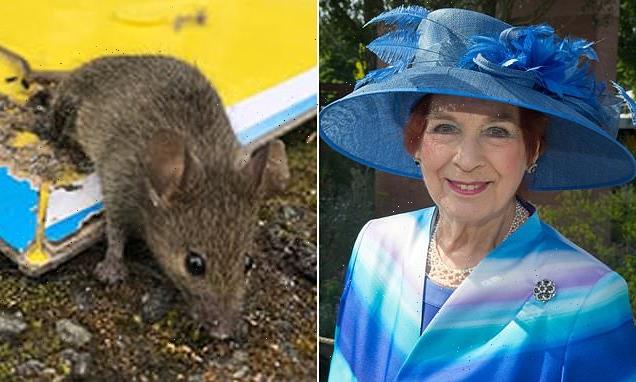
Baroness warns ministers she will be ‘after them’ if they do not act quickly to ban ‘torture’ glue traps for rats and mice
- Tory peer Baroness Fookes told House of Lords that banning use of glue traps to catch rodents will end a ‘great deal’ of suffering
- Glue traps are strips of plastic or cardboard coated in non-drying adhesive; when an animal crosses the board, it becomes stuck by its feet or fur
- House of Lords gave Glue Traps (Offences) Bill an unopposed second reading and it has already cleared the House of Commons
A peer has warned ministers she will ‘be after them’ if they do not swiftly enact measures within a ban on catching rats and mice with glue traps once it comes into force.
Conservative peer Baroness Fookes also told the House of Lords that banning the use of glue traps to catch rodents will end a ‘great deal’ of suffering.
The House of Lords gave the Glue Traps (Offences) Bill an unopposed second reading and it has already cleared the House of Commons.
The Bill would make it an offence to set a glue trap for the purpose of catching a rodent, as well as a handful of other connected offences.
Conservative peer Baroness Fookes told the House of Lords that banning the use of glue traps to catch rodents will end a ‘great deal’ of suffering. (File image of a glue trap, coated in powerful non-drying adhesive)
Anyone found guilty will be liable for either a fine or imprisonment.
Lady Fookes told the upper chamber she was ‘extremely proud’ to be sponsoring the Bill since ‘it will end a great deal of animal suffering’.
The peer, who serves as a Deputy Speaker in the Lords, insisted glue traps are ‘torture’.
She explained: ‘Glue traps, which are widely available and cheaply sold online and in various stores and shops, are small boards covered with a non-drying glue.
‘They usually sit down on the floor or on some horizontal surface.
What are glue traps?
Glue traps are strips of plastic or cardboard which are coated in a powerful non-drying adhesive.
They are left where rodents are likely to run and, when an animal crosses the board, it becomes stuck by its feet or fur.
During attempts to free themselves, animals have been known to rip out patches of fur, break their bones and even gnaw through their limbs.
If trapped animals are left unattended, they will slowly die from dehydration, starvation or exhaustion.
The RSPCA believes the traps cause unacceptable cruelty – to both the target species and potentially household pets.
‘Any animal which gets onto it is then immediately trapped by its feet or paws.
‘And this can lead to horrific injuries and suffering.
‘In a panic, the animal will probably try to tear itself away, maybe tearing the skin of its fur.
‘It will certainly suffer from exhaustion and from hunger if it is not immediately found. So, it could have a slow, lingering death.
‘Now, in my language, that is torture – and no animal, whether it is regarded as a pest or not, should have to suffer such an inhumane way of dying.’
As she later closed the debate, Lady Fookes pressed ministers to swiftly enact the Bill once it became law.
She said: ‘I hope very much that this will go through unamended because of the dangers that the Bill will be lost altogether, but let me say that I shall be following very closely the speed with which the department acts in dealing with these matters and the care that they have in drawing up the conditions attached to licences.
‘May I just forewarn my noble friend the minister that I shall be after him if there doesn’t seem to be satisfactory progress.’
Conservative peer Lord Randall of Uxbridge stressed that even though it is not the primary reason for the legislation, glue traps can ‘pose a danger to human health’ because ‘the animals are being in a position where they defecate and urinate once they are caught and that is a considerable danger’.
Environment minister Lord Benyon said the Government supported the Bill, but added that even when a ban comes into force, pest controllers could still be granted a licence to use glue traps in specific circumstances, such as ‘the possibility of a mouse being spotted in the cockpit of a commercial aircraft’.
Lady Fookes (above) told the upper chamber she was ‘extremely proud’ to be sponsoring the Bill since ‘it will end a great deal of animal suffering’. The House of Lords gave the Glue Traps (Offences) Bill an unopposed second reading and it has already cleared the House of Commons
The minister said: ‘In this case, the mouse must be caught quickly as there is a real risk to public safety if wiring was damaged.’
He added: ‘The wording of the Bill is clear that licences may only be granted for the purpose of preserving public health or public safety and when there is no other solution that is satisfactory.’
Lord Benyon contested claims that banning glue traps would lead to ‘problems with rodent infestation’ adding that the ‘experience of other countries’ which have already enacted a ban, such as Ireland and New Zealand, did not support this.
He also promised the Government would work to raise awareness ‘in the two years before the offences come into force’ to educate businesses and the public about the ban.
Source: Read Full Article

